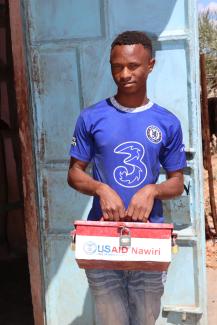Shoemaker Thrives in the Face of Adversity
In the dry landscapes of Samburu County is a small village called Nachola that hosts a community where members have to be strong and adaptable to survive. In that village lives James Lordo, a 20-year-old man, burdened by a challenging past, yet embraces a promising future.
James lost his father in his early years. His family experienced another tragedy when they lost his brother and their camels to bandits. Amidst the community's severe and enduring drought, Lordo's mother had the responsibility of being the sole provider. Each day, she faced the daunting task of ensuring her children had at least a meal. Spurred by these circumstances, James knew he needed to step up to help his mother and find his own means of survival.
Shoe repair was his first calling and he started to lean on it to provide relief. “I learnt how to repair shoes when I was still in high school,” Lordo enthusiastically explains. “It all started when I began fixing my friends' worn-out shoes, allowing me to earn some pocket money. I began my entrepreneurial journey with just a needle and a nylon thread.”
In early 2022, his sister Akale Epur, a recipient of USAID Nawiri’s Drought Emergency Response funds, introduced him to the program. Later, a mentor from the Boy Group and a fellow villager arranged a meeting to discuss the program's vision for their village and their role in making it a reality. The Boy Group is a peer-based intervention targeting adolescent and young men aged 10-29 to reduce persistent acute malnutrition by fostering positive masculinity, improving livelihoods, and increasing food security in their households and communities.
This inspired them to form the Natukon youth group, comprising 15 members. With the group formed, they started meeting every Friday afternoon. They would get training on basic education, health and nutrition, adolescent sexual and reproductive health, financial literacy, life skills, women empowerment, leadership, and water, sanitation, and hygiene.

Photo credit: Saruni Letiwa/USAID
The Natukon youth group also established a village savings and loan association (VSLA), where they pooled their money on a monthly basis for savings and a social fund. The funds were used to start businesses and meet household needs. They were provided with a metal savings box called 'Sanduku.' Driven by a desire to establish a business that would better support his family, Lordo borrowed KES 2,000 (USD $14) from the group's savings and started his shoe repair business.
"We thank Nawiri for providing these simple savings boxes that hold our collective dreams and aspirations," Lordo said.
"When I started, I was the only person operating such a unique business venture in Nachola. As a result, my business expanded rapidly, well over my expectations. Within no time, I was able to pay off my loan and the interest. Last December, I borrowed another loan to diversify my business,” he added. He now operates a kiosk offering essential household items like sugar, rice, and beans, as well as a solar-powered phone charging service.
USAID Nawiri is currently supporting 138 VSLA groups. There are 90 in Samburu North and 48 in Samburu East Sub County. As of May this year, these groups have collectively saved KES 1,862,469 (USD $13,260) and established a social fund of over KES 368,000 (USD $2,620). VSLA groups have effectively borrowed KES 783,529 (USD $5,578) while maintaining financial stability. As the VSLA groups in Samburu County thrive,thanks to USAID Nawiri’s support of, a resounding message echoes: when communities are empowered to shape their financial destinies, a legacy of lasting success is born.

